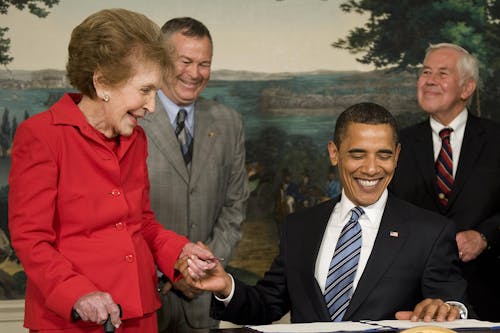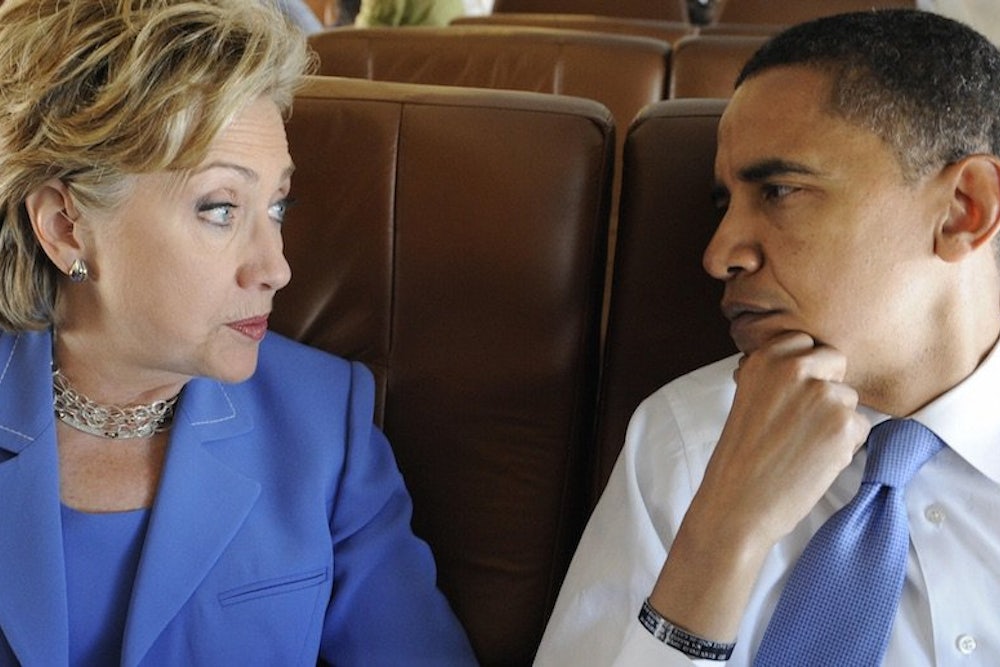The most memorable line in President Barack Obama’s January State of the Union address wasn’t part of his prepared remarks. It was a quick-on-his-feet wisecrack at the expense of congressional Republicans. When he said, as an entreaty to cooperate in a less politicized environment, "I have no more campaigns to run," a Republican contingent laughed and applauded. But rather than let them sneak one past him, Obama returned serve: “I know, ‘cause I won both of ‘em.”
The quip became a metonym for the full address, which was among the most combative of Obama’s presidency. But as an expression of defiance, it had precious little to do with the combative idea around which he constructed the speech itself.
At every step, we were told our goals were misguided or too ambitious; that we would crush jobs and explode deficits. Instead, we’ve seen the fastest economic growth in over a decade, our deficits cut by two-thirds, a stock market that has doubled, and health care inflation at its lowest rate in fifty years. So the verdict is clear. Middle-class economics works.
As a theme, this riff should have struck a chord with the conservative movement’s myriad Reaganologists. In his farewell address to the country in 1989, the 40th president scolded critics in a similar fashion.
Some pundits said our programs would result in catastrophe.... Our plans for the economy would cause inflation to soar and bring about economic collapse. I even remember one highly respected economist saying, back in 1982, that "the engines of economic growth have shut down here, and they're likely to stay that way for years to come.’’ Well, he and the other opinion leaders were wrong. The fact is, what they called "radical" was really "right." What they called "dangerous'' was just "desperately needed."
This similarity is no coincidence. Since he won the Iowa caucuses in 2008, and maybe before, Obama has seen in his presidency the potential for shifting the national paradigm, much the way Reagan did in the 1980s, but in a different direction. For the first six years of his presidency, though, slow economic growth and broad disenchantment with partisan politics left that goal out of reach. Until recently, it was taken as an article of faith in the commentariat that the next Democratic presidential nominee would have to distinguish herself from Obama, and promise to govern in a meaningfully different way.
The economy’s rapid growth in recent quarters has scrambled these assumptions, and now the White House is pitching the Reagan comparison to political reporters in Washington.
“All historical analogies are imperfect,” Obama’s senior adviser Dan Pfeiffer told me recently, but “people connected the economic success of the '80s to Reagan’s policies and Democrats also became convinced that the only way to win was to move to the middle. ... We want to make sure people understand the policies we put in place, how they work, how they’ve improved their situation, so when Republicans get back into it we’ll have shifted the four corners of the political debate to the left.”

The imperfections in this historical analogy include the fact that the Obama recovery remains incomplete and also entirely unacknowledged by millions of conservatives. In the quarter century since Reagan left office, the country has continued to polarize, making Obama more divisive as a president than George W. Bush, who in turn claimed the modern title from Bill Clinton. To change the American trajectory, Obama will have to make inroads with a segment of the population that’s more reflexively hostile to Democrats than any similarly large segment of the population has been since the Civil War era. But sustained success has a way of winning a grudging respect from less rabid political nemeses.
Over the next two years, America could experience unflagging economic growth, greater public confidence, and prosperity shared up and down the income scale. Or it could encounter unexpected economic headwinds, which return growth to its earlier, slower rate. Or worse. Republicans will speak as one, and with unpredictable persuasive force, to argue that Obama deserves no credit for this recovery, or shoulders all of the blame for its brevity and shortcomings. Which is to say that the path between today and the day Democrats can plausibly canonize Obama the way Republicans did Reagan is narrow, fraught, and very real.
Obama undoubtedly would’ve preferred to reach this point of promise earlier in his presidency. For a time he was dogged by a sense of dread that a hangover of skepticism and anxiety from the Great Recession, combined with an unimpressive economic recovery, would discredit, rather than sanctify, the reforms he put in place after he came into office.
“In 2012, one of the things that weighed on the president is if he lost the election," Pfeiffer said, "and then the economy began to pick up steam based on the policies we put in place in 2009 and 2010, the public would’ve attributed it to [Mitt] Romney’s policies when in fact the opposite was true,” and Democrats would have had to spend another generation beating back the presumption that supply side tax cuts and austerity are staples of a healthy economic diet.
But Romney didn’t win, and now that the economy is improving, the Obama team believes his victory should pay dividends for a more progressive vision. Whether it’s Obama’s particular approach of ostentatious, but systemic reforms—such as to the health insurance and financial systems—or a more radical one, liberal ideas deserve the benefits of incumbency.
If this belief were a pipe dream, Republicans would mock it, and continue to hang economic weakness around Obama’s neck like an albatross—the same way Democrats let ethics scandals and bloody foreign entanglements do the work of burying George W. Bush’s presidency for them. Instead, Republicans have taken the political fight to a traditionally Democratic venue, expressing solidarity with the poor and working classes, who have yet to share meaningfully in the rewards of the recovery.
“When Hillary Clinton runs, she’s going to say, ‘The Republicans gave us a crappy economy twice, and we fixed it twice. Why would you ever trust them again?’” Kevin Hassett, a Republican economist at the American Enterprise Institute, told The Washington Post recently. “The objective for the people in the Republican Party who want to defeat her is to come up with a story about what’s not great.”
Conservatives are likewise investing in arguments that appropriate credit for the recovery, much as they did in the 1990s when they mumbled awkwardly about how even the Clinton boom was Reagan’s doing.
As he took the helm of the Senate last month, Mitch McConnell said that “the uptick appears to coincide with the biggest political change of the Obama Administration’s long tenure in Washington: the expectation of a new Republican Congress.”
“Mr. Obama is now taking credit for 2014’s job gains that his policies inhibited, much as he is for the boom in oil and gas drilling that his Administration resisted,” the Wall Street Journal’s editors wrote recently. “Thus comes the opportunity for a late-term 'Seinfeld' economic epiphany. Imagine the possibilities if the President realized that everything he thought about economics is wrong."
Stuart Stevens, who managed Mitt Romney’s presidential campaign, says this is all a mugs game. “I don’t think Republicans should be—I don’t think anybody should be, right now—taking credit for the economy,” he told me a couple weeks after Obama’s State of the Union address. “I find Republicans trying to take credit for it misplaced. I don’t think the business of pointing out how things could be worse is particularly productive.”
By this view, Republicans should spend less time guarding against the political consequences of the Obama recovery, and more time dealing with facts as they are. Right now, they don’t add up to a Reagan-like legacy for Obama, and even if that changes, Republicans will have to do better than lamely claim it was all because of them.
“The reason 'Morning in America' worked is because people believed it,” Stevens said. “And they didn’t believe it because they heard it, they believed it because they felt it in their lives. You can’t tell wet people they’re dry. And you have to speak to that which people believe. What the mood of the country is will dictate what the politics are. If you continue with five percent GDP growth, that’ll be a different conversation than if we’re at 2.4.”
As it happens, that’s basically how team Obama sees things. Obama has been touring the country to press his argument about “middle-class economics” not because he expects the Reagan analogy to pan out, but in case it does.
When Reagan left office, he said, “We began the actions we felt would ignite an economic comeback—cut taxes and regulation, started to cut spending. And soon the recovery began.” If Obama is to become Reagan’s equal-but-opposite, he’ll need to sell the country on a similar post hoc fallacy.
He’ll also need the economy to enjoy uninterrupted growth. If it does, political science tells us Obama and his party stand to gain the most politically. But approval ratings can only do so much work, and these days it seems they can only climb so high. Back in 1989, not all conservatives were Republicans and not all liberals were Democrats. Thus, not too long ago, presidential approvals could swing from the 70s down to the 20s and then back up again. That made it easier for a popular president to sell the country on any proposition.
Today the floor is higher, but the ceiling’s lower, and it’s hard to imagine Obama ever winning favorable marks from more than around 55 percent of the public. “We are polarized to the point where the Republican base is never going to like something Obama does,” Pfeiffer acknowledges.
The question facing Obama, then, is whether the partisan divisions so fundamental to American politics today would overwhelm the storybook messaging of another "Morning in America." Are there any circumstances under which conservatives would embrace something other than supply-side tax policy, or ease their resistance to the New Deal consensus? Anyone who recalls Obama’s quaint notion that his re-election might “break the fever” on the right can be forgiven for rolling their eyes.
But a third-straight presidential election defeat, at the hands of a rising electorate that is younger and more liberal across the spectrum, would shake the GOP faithful in an unprecedented way. Obama has already benefited immeasurably from demographic changes, and has nurtured cultural ones, and these would compensate to some extent for the fact that Obama is very unlikely to leave office with Reaganesque popularity, no matter how good things get.
“If we can keep the Obama coalition involved in politics beyond Obama, it will have a huge impact on climate change, immigration and LGBT rights,” Pfeiffer said. “You can see a world where, given demographic trends, in both age and ethnicity, the next Republican president will be one who believes in climate change, supports immigration reform, and marriage equality, and a moderate economic approach.”
It’s a rosy scenario. It assumes that everything that can go well will go well. But if enough of America believes the White House's messaging—if they feel it in their lives—then Obama might be the new Reagan after all.
This piece has been updated.
